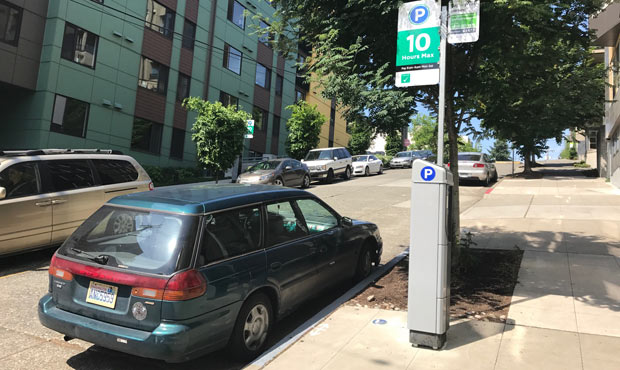Seattle council approves massive parking changes
Apr 2, 2018, 6:15 PM

(MyNorthwest file photo)
(MyNorthwest file photo)
Tenants without cars won’t have to pay for parking spots in their building after the Seattle City Council passed on Monday legislation that allows unbundling in leases, among other changes.
SDOT: Streetcar project is, perhaps, an example of poor management
The changes outlined in Council Bill 119221 (approved by the council 7-1), would require the unbundling of parking space rental from multi-family dwellings and lease agreements in new and existing structures with 10 dwelling units or more. Tenants would have the option to refuse a parking space, which would mean paying less for rent. The legislation would also allow building owners to make parking available for public use.
Councilmember Mike O’Brien says there’s actually plenty of parking in Seattle.
“We have lots of off-street parking that costs people money that they’re choosing not to use,” O’Brien said. “The shortage is not a shortage of parking. It’s a shortage of free on-street parking in our congested neighborhoods.”
A parking study done by King County Metro found that 30-35 percent of parking in existing buildings goes unused. The changes would allow flexibility in deciding how much parking to include in development projects in areas with frequent transit.
The City of Seattle says the legislation would enact several parking suggestions to improve housing affordability and neighborhood livability.
“We know that an over supply of cheap parking has a negative impact on Seattle – it increases driving and traffic congestion, increases our carbon footprint, and makes housing more expensive,” Councilmember Rob Johnson said in a news release following the vote.
RELATED: Downtown Seattle hotel comes with 170 rooms and no parking
The Seattle Times reports that new apartments came with an average of 1.5 parking spots in 2004. That number dropped to 0.6 spots in 2017. Supporters say that allowing developers to eliminate parking altogether would lower the cost of construction and thus, lower the cost of rent. Ultimately, no parking would establish a cheaper cost of living.
“People who cannot afford a car or choose not to own a car should not have to pay anything for parking,” Donald Shoup, author of The High Cost of Free Parking, said in a news release. “If drivers don’t pay for their parking, someone else has to pay for it, and that someone is everyone. But a city where everyone happily pays for everyone else’s free parking is a fool’s paradise.”













